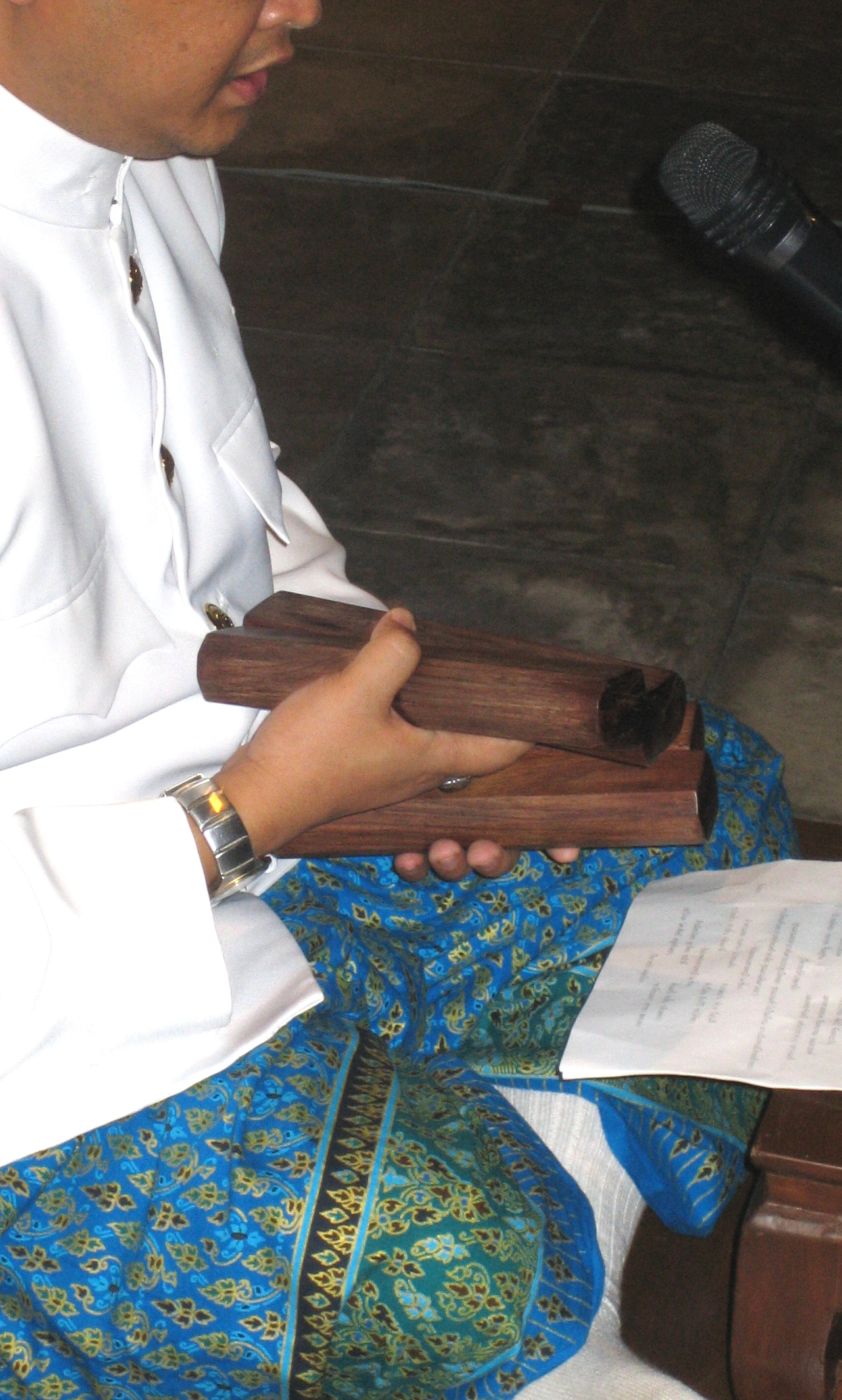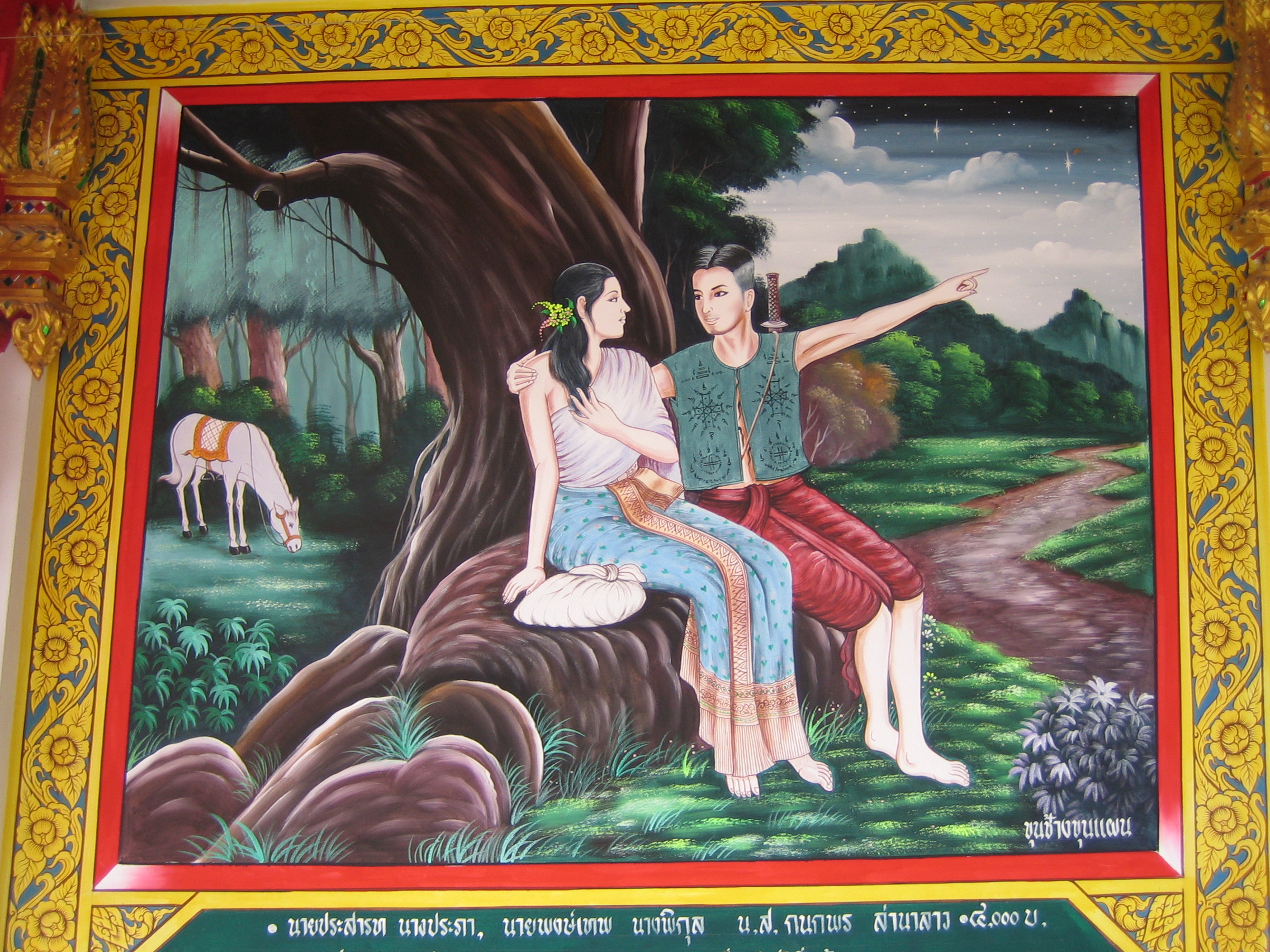|
Sepha
Sepha ( th, เสภา, ) is a genre of Thai poetic storytelling that had its origins in the performances of troubadours who stylized recitations were accompanied by two small sticks of wood (krap) to give rhythm and emphasis. The etymology of the word ''sepha'' is disputed. Origins The sepha genre was developed by troubadours who recited episodes for local audiences, and passed on stories by word-of-mouth. By the eighteenth century, such performances had become the most popular form of entertainment in Siam. The troubadours told the story in stylized recitation, using two small sticks of wood (krap) to give rhythm and emphasis. The performances typically lasted a full night. This genre later became known as sepha. Etymology The origin of the term ''Sepha'' is disputed. There is a musical form of the same name, but this seems unconnected. Kukrit Pramoj thought that sepha meant a jail and that the genre was developed by convicts in jail. Sujit Wongthet argued a connection to ... [...More Info...] [...Related Items...] OR: [Wikipedia] [Google] [Baidu] |
Khun Chang Khun Phaen
''Khun Chang Khun Phaen'' ( th, ขุนช้างขุนแผน, ) is a long Thai epic poem which originated from a legend of Thai folklore and is one of the most notable works in Thai literature. The work's entire length is over 20,000 couplets. Khun Chang and Khun Phaen are the leading male characters, where " Khun" was a junior feudal title given for male commoners. The story recounts the adventurous and amorous struggles of the three main protagonists. Much of their relationship can be described as a love triangle. Khun Phaen (dashing but poor) and Khun Chang (rich but ugly) compete for the lovely Wanthong from childhood for over fifty years. Their stories transpire amid the larger backdrop of national events, including two wars, several abductions, a suspected revolt, an idyllic sojourn in the forest, two court cases, trial by ordeal, jail, and treachery. Ultimately the King of Ayutthaya condemns Wanthong to death for failing to choose between the two men. The KCK ... [...More Info...] [...Related Items...] OR: [Wikipedia] [Google] [Baidu] |
Sujit Wongthet
Sujit Wongthes (or Wongthet) (b. 1945) is a Thai journalist, historian, and author. Biography Wongthes attended Silpakorn University, graduating from the archaeology program there. During his time at university, he wrote for the student journal, ''Sangkhomsat Paritht'' (''Social Science Review''), in which he criticized excessive materialism and the Americanization of Thai culture; he wrote contemporaneously with Sulak Sivaraksa, who was the journal's editor at the time. He later wrote for ''Prachachat'', a newspaper associated with progressive elements of Thai society. After the military coup that toppled the Seni Pramoj administration, ''Prachachat'' was shut down. Three years later, Wongthes founded '' Sinlapa Watthanatham'', an arts and culture magazine, and served as the magazine's editor.Lysa, Hon"Twenty Years of Sinlapa Watthanatham: Cultural Politics in Thailand in the 1980s and 1990s"''Journal of Southeast Asian Studies'' 31,1 (March 2000), 26-47 One of Wongthes' best-k ... [...More Info...] [...Related Items...] OR: [Wikipedia] [Google] [Baidu] |
Epic Poetry
An epic poem, or simply an epic, is a lengthy narrative poem typically about the extraordinary deeds of extraordinary characters who, in dealings with gods or other superhuman forces, gave shape to the mortal universe for their descendants. Etymology The English word ''epic'' comes from Latin ''epicus'', which itself comes from the Ancient Greek adjective (''epikos''), from (''epos''), "word, story, poem." In ancient Greek, 'epic' could refer to all poetry in dactylic hexameter (''epea''), which included not only Homer but also the wisdom poetry of Hesiod, the utterances of the Delphic oracle, and the strange theological verses attributed to Orpheus. Later tradition, however, has restricted the term 'epic' to ''heroic epic'', as described in this article. Overview Originating before the invention of writing, primary epics, such as those of Homer, were composed by bards who used complex rhetorical and metrical schemes by which they could memorize the epic as receive ... [...More Info...] [...Related Items...] OR: [Wikipedia] [Google] [Baidu] |
Journal Of The Siam Society
The ''Journal of the Siam Society'' (JSS) is a scholarly journal published by the Siam Society in Bangkok since 1904. History The ''Journal of the Siam Society'' is published by The Siam Society Under Royal Patronage in Bangkok, Thailand. At the foundation of the society in 1904, the journal was launched to fulfil the society's purpose: The objects of the Society shall be the investigation and encouragement of Art, Science and Literature in relation to Siam and neighbouring countries…. For this purpose the Society will convene meetings, at which papers bearing on the objects for which the Society is formed will be read, or lectures given…. Such papers shall, if they are accepted by the Council, be published in a Journal, and the authors of them may, by permission of the Council, republish them in a separate form. The first issue of the journal, dated 1904, appeared in August 1905. Publication has been continuous ever since, missing a few issues, particularly during World ... [...More Info...] [...Related Items...] OR: [Wikipedia] [Google] [Baidu] |
Rama IV
Mongkut ( th, มงกุฏ; 18 October 18041 October 1868) was the fourth monarch of Siam (Thailand) under the House of Chakri, titled Rama IV. He ruled from 1851 to 1868. His full title in Thai was ''Phra Bat Somdet Phra Menthora Ramathibodi Sri Sinthara Mahamakut Phra Mongkut Phra Siam Deva Mahamakut Wittaya Maharaj'' (พระบาทสมเด็จพระปรเมนทรรามาธิบดีศรีสินทรมหามงกุฎ พระจอมเกล้าเจ้าอยู่หัว พระสยามเทวมหามกุฏวิทยมหาราช). Outside Thailand, Mongkut is best known as the king in the 1951 musical and 1956 film ''The King and I'', based on the 1946 film '' Anna and the King of Siam''in turn based on a 1944 novel by an American author about Anna Leonowens' years at his court, from 1862 to 1867, drawn from Leonowens’ memoir. Siam first felt the pressure of Western expansionism during Mongku ... [...More Info...] [...Related Items...] OR: [Wikipedia] [Google] [Baidu] |
Sanskrit
Sanskrit (; attributively , ; nominalization, nominally , , ) is a classical language belonging to the Indo-Aryan languages, Indo-Aryan branch of the Indo-European languages. It arose in South Asia after its predecessor languages had Trans-cultural diffusion, diffused there from the northwest in the late Bronze Age#South Asia, Bronze Age. Sanskrit is the sacred language of Hinduism, the language of classical Hindu philosophy, and of historical texts of Buddhism and Jainism. It was a lingua franca, link language in ancient and medieval South Asia, and upon transmission of Hindu and Buddhist culture to Southeast Asia, East Asia and Central Asia in the early medieval era, it became a language of religion and high culture, and of the political elites in some of these regions. As a result, Sanskrit had a lasting impact on the languages of South Asia, Southeast Asia and East Asia, especially in their formal and learned vocabularies. Sanskrit generally connotes several Indo-Aryan lang ... [...More Info...] [...Related Items...] OR: [Wikipedia] [Google] [Baidu] |
Kukrit Pramoj
Mom Rajawongse Kukrit Pramoj ( th, คึกฤทธิ์ ปราโมช, , ; 20 April 1911 – 9 October 1995) was a Thai politician, scholar and professor. He was Speaker of the House of Representatives of Thailand 1973–1974. He was the thirteenth Prime Minister of Thailand, serving in office from 1975 to 1976 between Seni Pramoj, his brother's, terms. Being the great-grandson of King Rama II, he was a member of the Thai royal family. He also portrayed the Prime Minister of the fictional country of "Sarkhan" in the 1963 motion picture '' The Ugly American'' with Marlon Brando. Biography He was born on 20 April 1911 at Sing Buri Province into an cadet branch of Chakri Dynasty with Chinese ancestry. The son of Brigadier General Prince Khamrob and his wife Daeng ( Bunnag), his older brother was M.R. Seni Pramoj while his great-grandmother, Ampha, was of Chinese descent and was a consort of Rama II. He served as a corporal during the Franco-Thai War in 1940. Like many u ... [...More Info...] [...Related Items...] OR: [Wikipedia] [Google] [Baidu] |
Thai Poetry
Poetry has been featured extensively in Thai literature, and constituted the near-exclusive majority of literary works up to the early Rattanakosin period (early 19th century). Most of imaginative literary works in Thai, before the 19th century, were composed in poetry. Consequently, although many literary works were lost with the sack of Ayutthaya in 1767, Thailand still has a great number of epic poems or long poetic tales -- some with original stories and some with stories drawn from foreign sources. The Siamese poetical medium consists of five main forms, known as ''khlong'', ''chan'', ''kap'', ''klon'' and ''rai''; some of these developed indigenously while others were borrowed from other languages. Thai poetry dates to the Sukhothai period (13th–14th centuries) and flourished under Ayutthaya (14th–18th centuries), during which it developed into its current forms. Though many works were lost to the Burmese conquest of Ayutthaya in 1767, sponsorship by subsequent kings h ... [...More Info...] [...Related Items...] OR: [Wikipedia] [Google] [Baidu] |
History Of Thailand
The Tai ethnic group migrated into mainland Southeast Asia over a period of centuries. The word ''Siam'' ( th, สยาม ) may have originated from Pali (''suvaṇṇabhūmi'', "land of gold") or Sanskrit श्याम (''śyāma'', "dark") or Mon ရာမည (''rhmañña'', "stranger"), probably the same root as Shan and Ahom. ''Xianluo'' () was the Chinese name for Ayutthaya Kingdom, merged from Suphannaphum city state centered in modern-day Suphan Buri and Lavo city state centered in modern-day Lop Buri. To the Thai, the name has mostly been ''Mueang Thai''. The country's designation as Siam by Westerners likely came from the Portuguese. Portuguese chronicles noted that the Borommatrailokkanat, king of the Ayutthaya Kingdom, sent an expedition to the Malacca Sultanate at the southern tip of the Malay Peninsula in 1455. Following their conquest of Malacca in 1511, the Portuguese sent a diplomatic mission to Ayutthaya. A century later, on 15 August 1612, ''The G ... [...More Info...] [...Related Items...] OR: [Wikipedia] [Google] [Baidu] |
Troubadour
A troubadour (, ; oc, trobador ) was a composer and performer of Old Occitan lyric poetry during the High Middle Ages (1100–1350). Since the word ''troubadour'' is etymologically masculine, a female troubadour is usually called a '' trobairitz''. The troubadour school or tradition began in the late 11th century in Occitania, but it subsequently spread to the Italian and Iberian Peninsulas. Under the influence of the troubadours, related movements sprang up throughout Europe: the Minnesang in Germany, '' trovadorismo'' in Galicia and Portugal, and that of the trouvères in northern France. Dante Alighieri in his '' De vulgari eloquentia'' defined the troubadour lyric as ''fictio rethorica musicaque poita'': rhetorical, musical, and poetical fiction. After the "classical" period around the turn of the 13th century and a mid-century resurgence, the art of the troubadours declined in the 14th century and around the time of the Black Death (1348) it died out. The texts of ... [...More Info...] [...Related Items...] OR: [Wikipedia] [Google] [Baidu] |








.jpg)